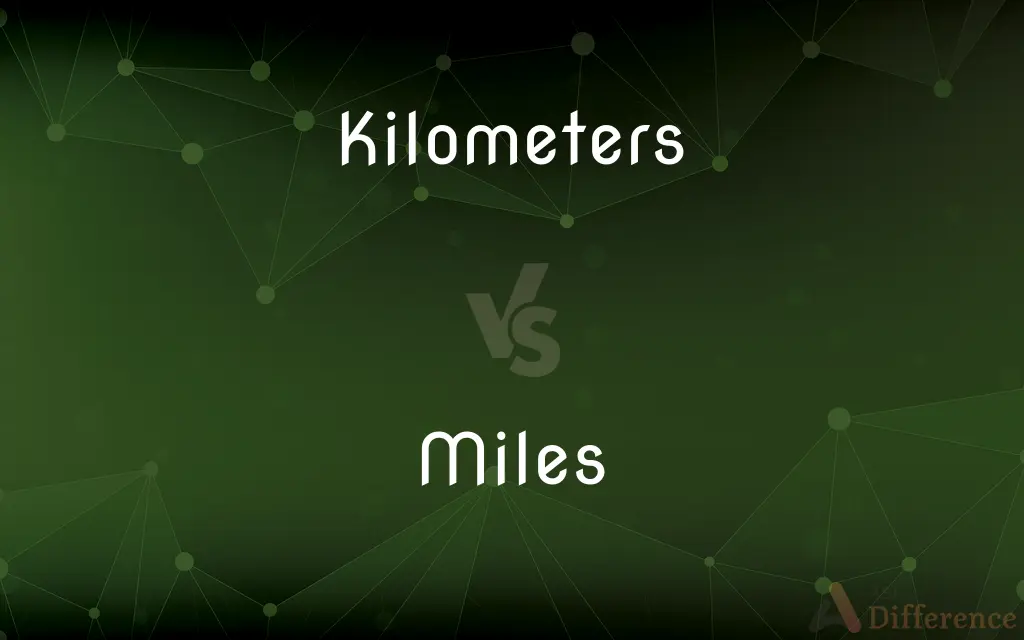Kilometers vs. Miles — What's the Difference?
Edited by Tayyaba Rehman — By Fiza Rafique — Published on November 20, 2023
Kilometers and Miles are units of distance. Kilometers are used in the metric system, whereas Miles are used in the imperial system. 1 mile is approximately 1.60934 kilometers.

Difference Between Kilometers and Miles
Table of Contents
ADVERTISEMENT
Key Differences
Kilometers are a unit of measurement used primarily in countries that have adopted the metric system. This system of measurement is used globally in various fields like science, engineering, and commerce. On the other hand, Miles are used predominantly in the United States and a few other countries that employ the imperial or customary system of measurement.
Kilometers, often abbreviated as "km," are the standard unit for measuring distance in most countries worldwide. This unit's origin is grounded in the meter, the fundamental unit of length in the metric system. Conversely, Miles, often represented by "mi," have their roots in ancient Roman measurements and have evolved over the years in various forms across different cultures.
In terms of conversion, 1 kilometer is equal to approximately 0.621371 miles. This means that if you are traveling at a speed of 100 kilometers per hour, you are going at around 62.1371 miles per hour. On the flip side, to convert miles to kilometers, you'd multiply the number of miles by 1.60934.
For everyday purposes, people often use round figures. For instance, they might say 1 mile is about 1.6 kilometers to simplify. Both Kilometers and Miles serve as benchmarks for measuring distances between two points, be it on road signs, in vehicles, or in athletics.
While both Kilometers and Miles achieve the same purpose of indicating distance, the context in which they are used and their origins make them distinct. Familiarity with both units is valuable, especially in an increasingly globalized world where travel and communication occur across countries with different standard measurements.
ADVERTISEMENT
Comparison Chart
System Used
Metric System
Imperial System
Abbreviation
Km
Mi
Origin
Based on the meter
Ancient Roman
Common Usage
Global except few
USA and few others
Conversion to Other
1 km ≈ 0.621 mi
1 mi ≈ 1.609 km
Compare with Definitions
Kilometers
A unit of length in the metric system equal to 1,000 meters.
The city center is 5 kilometers away from here.
Miles
A unit of linear measure equal to 5,280 feet, or 1,760 yards.
The next gas station is 10 miles down the road.
Kilometers
A metric measure of distance or length.
The marathon race is 42.195 kilometers long.
Miles
Rooted in ancient Roman measurements and has historical significance.
The Roman soldiers often marched for miles without rest.
Kilometers
A standard unit for quantifying roadway and travel distances outside the US.
Most European countries display distances in kilometers.
Miles
Often used in English-speaking countries for vehicular and air travel distances.
The flight covered 3,000 miles across the continent.
Kilometers
One of the base units in the metric system for length.
The tunnel extends for several kilometers underground.
Miles
An imperial unit commonly used to denote distances in the US and UK.
The Grand Canyon is hundreds of miles in length.
Kilometers
Often used in science and engineering to denote large distances.
The comet was several thousand kilometers in diameter.
Miles
Also used metaphorically to indicate a great amount or distance.
His new place feels miles away from the city's hustle and bustle.
Kilometers
A metric unit of length equal to 1,000 meters (0.62 mile). See Table at measurement.
Miles
Abbr. mi. or mi A unit of length equal to 5,280 feet or 1,760 yards (1,609 meters), used in the United States and other English-speaking countries. Also called land mile, statute mile. See Table at measurement.
Kilometers
Plural of kilometer
Miles
A nautical mile.
Miles
An air mile.
Miles
(Sports) A race that is one mile long.
Miles
A relatively great distance
Had to walk for miles in the airport.
Miles
Plural of mile
Miles
(informal) A great distance in space or time.
His final shot missed the bullseye by miles.
From the top of the hill you can see for miles.
No need to hurry. The deadline is miles away.
Miles
Much; a lot used to emphasise a comparative
Her new paintings are miles better than her older ones.
Common Curiosities
Which is longer, a kilometer or a mile?
A mile is longer than a kilometer.
What system does kilometers belong to?
Kilometers belong to the metric system.
How many kilometers are there in a mile?
There are approximately 1.60934 kilometers in a mile.
In which system are miles primarily used?
Miles are used in the imperial and US customary systems.
Why do some countries use kilometers while others use miles?
It depends on whether the country uses the metric or the imperial system. Most countries have adopted the metric system, while a few, like the USA, still use the imperial system.
How do I convert miles to kilometers?
Multiply the number of miles by approximately 1.60934.
What is the abbreviation for kilometers and miles?
Kilometers are abbreviated as "km" and miles as "mi."
Are nautical miles the same as regular miles?
No, a nautical mile is based on the circumference of the earth and is equal to one minute of latitude. It is longer than a regular mile.
What's the origin of the word 'mile'?
The word 'mile' comes from the Latin word 'mille,' which means 'thousand', referring originally to 1,000 paces.
When driving, how can I quickly estimate the distance in miles if I know the distance in kilometers?
A rough estimate is to take a little more than half the distance in kilometers to get the distance in miles.
Are there efforts to make the entire world adopt kilometers over miles?
Many countries have already shifted to the metric system. However, full global adoption is not enforced, and some countries choose to retain the imperial system.
How do GPS devices calculate distances: in kilometers or miles?
Most GPS devices can display distances in both kilometers and miles, depending on the user's preference or the regional setting.
Is the metric system, which uses kilometers, more widely accepted globally?
Yes, the metric system is globally accepted in various fields like science, engineering, and commerce, with a few exceptions like the US, which predominantly uses the imperial system.
Why are there different systems like kilometers and miles?
Historical, cultural, and practical reasons have led to the development of different measurement systems in different parts of the world.
In athletics, are races measured in kilometers or miles?
It varies. For instance, marathons are measured in kilometers (42.195 km), but many races in the US are still measured in miles.
Share Your Discovery

Previous Comparison
Hyundai i10 vs. Hyundai i20
Next Comparison
Linoleum vs. MarmoleumAuthor Spotlight
Written by
Fiza RafiqueFiza Rafique is a skilled content writer at AskDifference.com, where she meticulously refines and enhances written pieces. Drawing from her vast editorial expertise, Fiza ensures clarity, accuracy, and precision in every article. Passionate about language, she continually seeks to elevate the quality of content for readers worldwide.
Edited by
Tayyaba RehmanTayyaba Rehman is a distinguished writer, currently serving as a primary contributor to askdifference.com. As a researcher in semantics and etymology, Tayyaba's passion for the complexity of languages and their distinctions has found a perfect home on the platform. Tayyaba delves into the intricacies of language, distinguishing between commonly confused words and phrases, thereby providing clarity for readers worldwide.














































